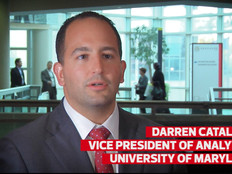Artificial Intelligence
EDUCAUSE 2024: The Risks and Rewards of Artificial Intelligence in Higher Education
The world took notice when OpenAI released the high-powered large language model ChatGPT in November 2022. Nearly two years later, at EDUCAUSE 2024 in San Antonio, artificial intelligence was still a hot topic of conversation among higher education’s leading technologists.
They mostly agree that AI is a tool that could be beneficial to colleges and universities in a number of ways, but acknowledge that just because an AI solution exists, that doesn’t mean it’s the right solution. Working backward from a problem to identify if AI is the best path forward is a good way to avoid making AI mistakes, and ensuring good data governance before implementing AI is vital to producing accurate outcomes.
Participants
Jenay Robert, Senior Researcher, EDUCAUSE
David Seidl, Vice President for IT and CIO, Miami University
Helen Patton, Cybersecurity Executive Advisor, Cisco
Video Highlights
- Artificial intelligence could help solve some of higher education’s most persistent problems, but just because something uses AI doesn’t mean it’s the right solution.
- Colleges and universities would be best served using AI in low-risk situations at first, then moving to areas such as student success, where the stakes are much higher.
- Inputting bad data into an AI tool will produce bad outcomes and recommendations that, if followed, could lead universities to make bad decisions that might impact the institution for years to come.






